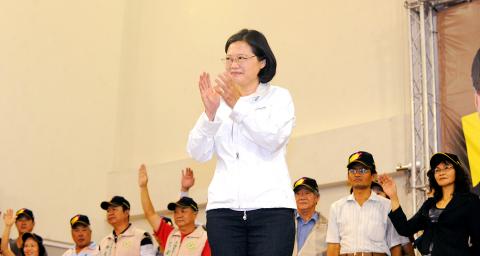Democratic Progressive Party (DPP) presidential candidate Tsai Ing-wen (蔡英文) is working hard and looking forward to the first of three crucial TV presidential debates, which will be held on Saturday.
With recent public opinion polls showing Tsai has overtaken President Ma Ying-jeou (馬英九), who is seeking re-election, in public support, Tsai will seek to solidify her lead in the presidential race with strong performances in the debates.
Candidates representing the Chinese Nationalist Party (KMT), the DPP and the People First Party (PFP) will take part in the debates, which will take place on Saturday, Dec. 10 and Dec. 17, and will be hosted by the Central News Agency and five other media outlets — Public Television Service (PTS), the China Times, the Liberty Times (the Taipei Times’ sister newspaper), the United Daily News and the Apple Daily.

Photo: Huang Chih-yuan, Taipei Times
The first debate will be held from 2pm to 4:30pm on Saturday and will be moderated by the organizing media outlets. The second will be moderated by representatives from NGOs.
The DPP is using Tsai’s speech at the American Chamber of Commerce in Taipei last week to prepare for the debates, as Tsai spoke immediately after Ma on that occasion.
The party said it was pleased with the results.
The debates will be more than just an opportunity to extend Tsai’s lead in the polls, but also an occasion for her to take “revenge” for the first debate between her and Ma last year, in which Ma was widely considered to have bested his opponent.
That debate took place in April last year, and centered on the Economic Cooperation Framework Agreement (ECFA).
While Tsai has long been known for her logic and recognized as an articulate speaker and a “thinker,” most analysts said after the debate that Ma was more successful in appealing to the audience, despite dodging most of Tsai’s questions.
Ma will not be Tsai’s only opponent this time, with PFP Chairman James Soong (宋楚瑜) also entering the debates as the third presidential candidate.
While Soong is expected to focus most of his attacks on Ma, he is unlikely to give Tsai much breathing room.

ANOTHER EMERGES: The CWA yesterday said this year’s fourth storm of the typhoon season had formed in the South China Sea, but was not expected to affect Taiwan Tropical Storm Gaemi has intensified slightly as it heads toward Taiwan, where it is expected to affect the country in the coming days, the Central Weather Administration (CWA) said yesterday. As of 8am yesterday, the 120km-radius storm was 800km southeast of Oluanpi (鵝鑾鼻), Taiwan’s southernmost tip, moving at 9kph northwest, the agency said. A sea warning for Gaemi could be issued tonight at the earliest, it said, adding that the storm is projected to be closest to Taiwan on Wednesday or Thursday. Gaemi’s potential effect on Taiwan remains unclear, as that would depend on its direction, radius and intensity, forecasters said. Former Weather Forecast

As COVID-19 cases in Japan have been increasing for 10 consecutive weeks, people should get vaccinated before visiting the nation, the Centers for Disease Control (CDC) said. The centers reported 773 hospitalizations and 124 deaths related to COVID-19 in Taiwan last week. CDC Epidemic Intelligence Center Director Guo Hung-wei (郭宏偉) on Tuesday said the number of weekly COVID-19 cases reported in Japan has been increasing since mid-May and surpassed 55,000 cases from July 8 to July 14. The average number of COVID-19 patients at Japan’s healthcare facilities that week was also 1.39 times that of the week before and KP.3 is the dominant

The Chinese Communist Party’s (CCP) working group for Taiwan-related policies is likely to be upgraded to a committee-level body, a report commissioned by the Mainland Affairs Council (MAC) said. As Chinese President Xi Jinping (習近平) is increasingly likely to upgrade the CCP’s Central Leading Group for Taiwan Affairs, Taiwanese authorities should prepare by researching Xi and the CCP, the report said. At the third plenary session of the 20th Central Committee of the CCP, which ended on Thursday last week, the party set a target of 2029 for the completion of some tasks, meaning that Xi is likely preparing to

US-CHINA TRADE DISPUTE: Despite Beijing’s offer of preferential treatment, the lure of China has dimmed as Taiwanese and international investors move out Japan and the US have become the favored destinations for Taiwanese graduates as China’s attraction has waned over the years, the Ministry of Labor said. According to the ministry’s latest income and employment advisory published this month, 3,215 Taiwanese university graduates from the class of 2020 went to Japan, surpassing for the first time the 2,881 graduates who went to China. A total of 2,300 graduates from the class of 2021 went to the US, compared with the 2,262 who went to China, the document showed. The trend continued for the class of 2023, of whom 1,460 went to Japan, 1,334 went to